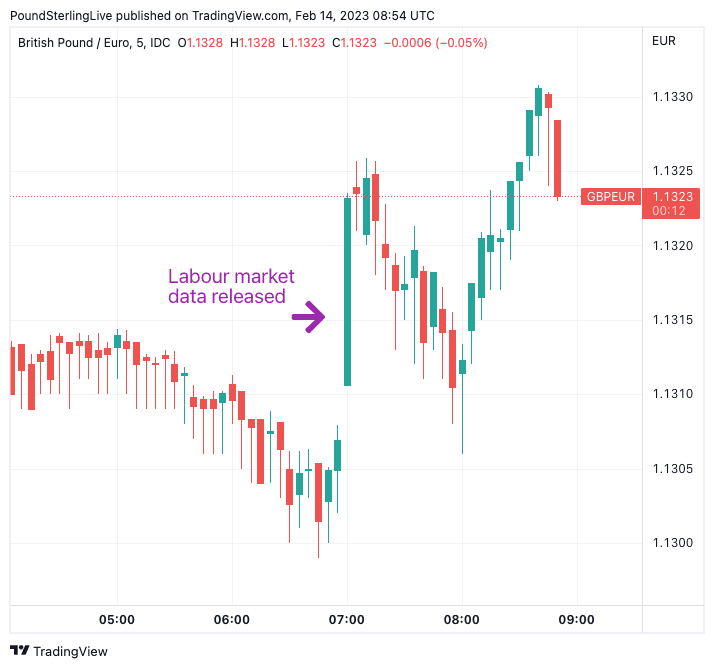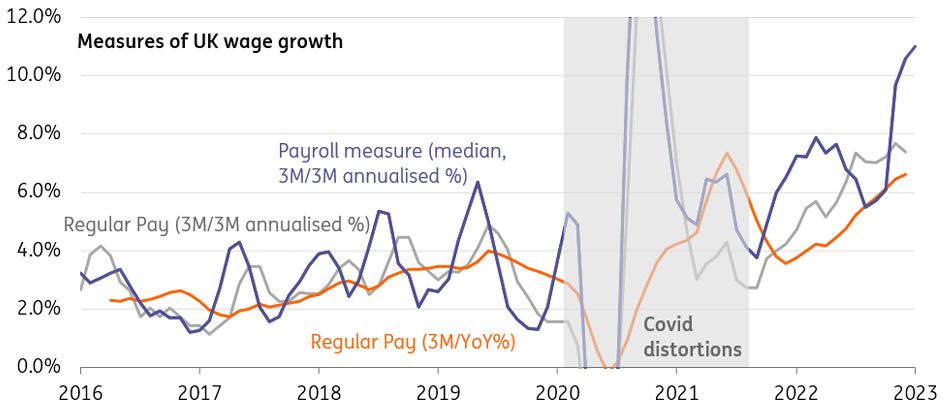Pound Sterling Boosted by Strong UK Wage Growth Data
- Written by: Gary Howes
- Wages up 6.7%
- Employment up 74K 3M/3M
- Inactivity rate down 0.3%

Image © Adobe Stock
The British Pound was higher in the wake of data that revealed UK wages continue to grow at inflationary levels amidst ongoing 'tightness' in the UK labour market.
UK regular wages grew at their fastest pace outside of the Covid pandemic period at 6.7% in the year to December said the ONS, outstripping growth of 6.5% seen the year before and economist expectations for 6.5% growth.
The Pound displayed a clear reaction and rose 0.15% against the Euro in the half-hour that followed the release.
When bonuses are included, the figure was 5.9%, which is less than the 6.2% the market was expecting and less than the previous month's 6.2%. The ONS said the softening was due to the statistical effect of a strong financial services sector bonus round from a year earlier falling out of the data.
Above: GBP/EUR showed a clear reaction to the labour market statistics.
"UK labour market data released this morning confirmed that there was no material loosening in labour market conditions as we ended last year," says Ellie Henderson, an economist at Investec.
"In such an environment of high vacancies and a relatively small pool of available labour, it is unsurprising that wage growth remained elevated," she adds.
The Bank of England said it would monitor wage dynamics closely when deciding whether to raise interest rates again in March; judging that strong wage growth to be consistent with an extended period of high inflation.
These figures suggest the labour market remains 'tight' and further rate hikes are possible. "The pound is appreciating because it increases the burden on the Bank of England (BoE) to keep raising interest rates to combat inflationary pressures," says George Vessey, FX and Macro Strategist at Convera.
Compare Currency Exchange Rates
Find out how much you could save on your international transfer
Estimated saving compared to high street banks:
£2,500.00
Free • No obligation • Takes 2 minutes
Driving labour market 'tightness' was an increase in employment of 74K in the three months to December, which exceeded the 40K the market was looking for and represents a strong uptick on the November figure of 27K.
The Pound to Euro exchange rate rose to 1.1322 in the wake of the data, and the Pound to Dollar exchange rate rose to 1.2166. (Consider setting a free FX rate alert here to better time your payment requirements.)
The UK unemployment rate remains unchanged at 3.7%.
The Bank expects unemployment to increase through 2023, which they expect to take the pressure off wages and, therefore, inflation. It is this expectation that saw the Bank indicate in February that they are nearing the point they can end their rate hiking cycle.
Above: "UK wage growth doesn't seem to have peaked" - ING. Image source: ING, data source: Macrobond, ING calculations.
But the latest wage figures are yet to show these dynamics are coming through.
Economists at ING say these labour market statistics will likely prompt the Bank of England into raising interest rates further.
"There's little sign that UK wage growth has reached a peak, and the jobs market looks reasonably healthy. A 25bp rate hike at the March meeting seems likely," says James Smith, Developed Markets Economist at ING.
A significant driver of labour market tightness has been the shrinking of the UK workforce following the pandemic which has restricted labour supply and encouraged businesses to offer higher wages to attract and retain employees in a dwindling pool of available labour.
But the ONS says the situation is improving as their estimates between July-September 2022 and October-December 2022 show that there was a record-high net flow out of economic inactivity, driven by people moving from economic inactivity to employment.
If this trend continues it could prompt a rise in the unemployment rate and reduce upside pressure on wages in the coming months.
"The Bank of England will be increasingly concerned about the persistence of domestic inflationary pressures as private sector wage growth (excluding bonuses) exceeded its forecast. This supports our view that the Bank of England will have to raise interest rates from 4.00% now to a peak of 4.50% in the coming months," says Ashley Webb, UK Economist at Capital Economics.
For the Pound, such expectations are supportive, say some analysts.
"Sterling has thus reacted positively to the subsequent jump in UK rate expectations with GBP/USD testing its 50-day moving average near $1.2184 this morning and GBP/EUR holding firm above €1.13. The UK inflation report tomorrow morning is the next key event for sterling after US inflation today," says Vessey.
Compare Currency Exchange Rates
Find out how much you could save on your international transfer
Estimated saving compared to high street banks:
£2,500.00
Free • No obligation • Takes 2 minutes






